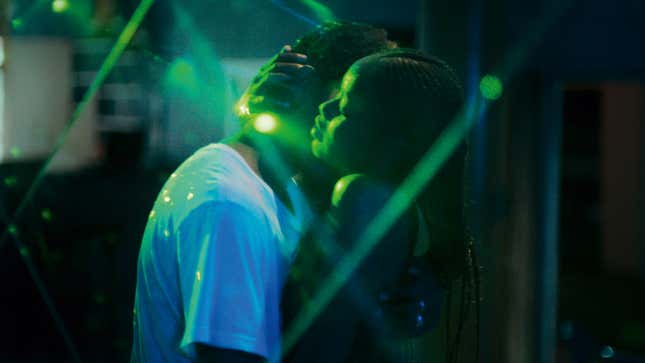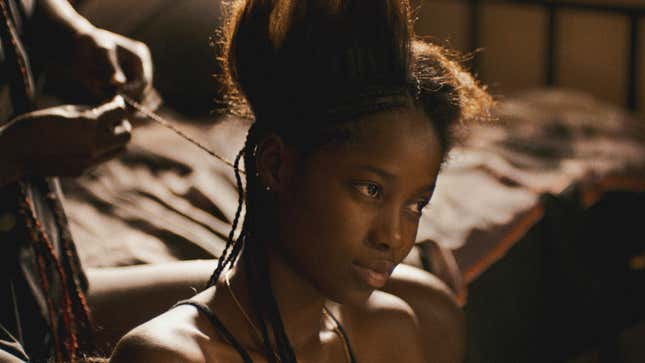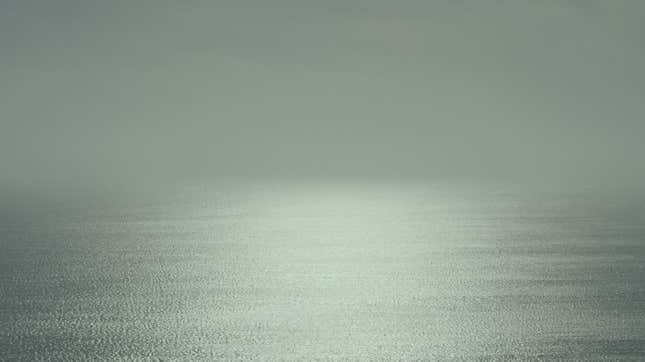Atlantics Director Mati Diop Has Mixed Feelings on Her Historic Cannes Win
Entertainment
Image: Les Films du Bal
First-time feature director Mati Diop made headlines in May (including on this very website) for making history. When her film Atlantics won the Cannes Film Festival’s Grand Prix award (“effectively second prize,” says A.O. Scott), she became the first black woman ever to win at the festival in its 72-year history. In fact, Atlantics was the first film by a black woman to screen in competition ever at the festival.
For Diop, it was a mixed blessing. While she was proud of the honor, she told Jezebel in October, while in New York to promote her film, “Cannes is not a place where you have long and involved conversations. It really becomes about what you represent more than your film and how it was written, how it was directed. I kind of accept that very reductive approach to me.”
Reductive is one thing Diop’s film is not. In turn a romance, a procedural, a ghost story, and an indictment of patriarchy, Atlantics pulses with thrilling multivalence and pragmatic aesthetic sensibility. Diop, who was born in Paris, shot the film in Senegal, where some of her family is from (her uncle Djibril Diop Mambéty is a well-known Senegalese filmmaker). The basic premise—Senegalese laborers who haven’t been paid by their corrupt land baron boss for months set sail for Spain in search of jobs and a better life—was based on a true account Diop heard from one such worker. With the tide goes Souleiman (Traore), the boyfriend of Atlantics protagonist Ada (Mame Bineta Sane), who’s heading into an arranged marriage with a man she doesn’t love, Omar (Babacar Sylla). Souleiman and his coworkers never return from their voyage and are presumed dead. Until.
Diop’s work is exciting, and she speaks about it with great engagement. She had a lot to say about her work and the public’s perception of it. She also has a sense of humor about her work, despite its heaviness—when I pointed out that Atlantics’ frequent transitional shots of the sun blazing on the ocean surprised me for being so arresting in their simplicity, she chirped, “Clichés are inexhaustible!” Her first language is French, and she spoke with the sporadic help of a translator (a word here, a phrase there). Below is an edited and condensed transcript of our discussion.
JEZEBEL: What was your immediate reaction to winning at Cannes, and now that some time is passed, what do you think of it today?
MATI DIOP: When I found out that the film was in competition, I was still editing it. The first thing I thought about was that I was shocked and amazed with a first feature as a filmmaker to go there. I was also a little skeptical. Even if you want to trust the programmers of a festival, you know that being in competition is always a mix of good and bad reasons. Good reasons, meaning for the film only, and bad reasons meaning what you represent. It was mixed feelings. It’s only when I found out in the newspaper that I realized that I was the first black woman. I don’t necessarily think about the fact that I’m nonwhite every day when I wake up. It’s strange, but when I saw it written down, I was like, “Fuck, it’s true, it’s me. I’m the first black woman.” It’s a reminder that it never happened and we are in 2019. It’s incredible, but it’s actually a fact.
It took up a lot of space at Cannes, but I was not really disturbed by it because I know that Cannes is not a place where you have long and involved conversations. It really becomes about what you represent more than your film and how it was written, how it was directed. I kind of accept that very reductive approach to me. I went to Cannes ready to be reduced to a woman, to a black woman. I think there is worse in the world to face as an experience. I was still very happy that the film was liked and that it was going to reach a much larger audience. And you know, I had some white friends telling me, “I’m so pissed that they focused on that.” On one hand, it is a big deal. It has never happened before so it’s obviously going to be an event, and then you get aware that you might become a reference, an inspiration maybe for nonwhite directors, which is very beautiful—to be able to inspire other people. But then at the same time, I was like, “I don’t want people to be inspired just because I’m black. I want people to be inspired by the film.”
So it all happened very fast, and I have a hard time being reduced to anything. All my cinema is built against shortcuts. Suddenly you become a huge cliché… I mean, you know, it’s how things work.
-

-

-

-

-

-

-

-

-

-

-

-

-

-

-

-

-

-

-

-

-

-

-

-

-

-

-

-

-

-

-

-

-

-

-

-

-

-

-

-










































